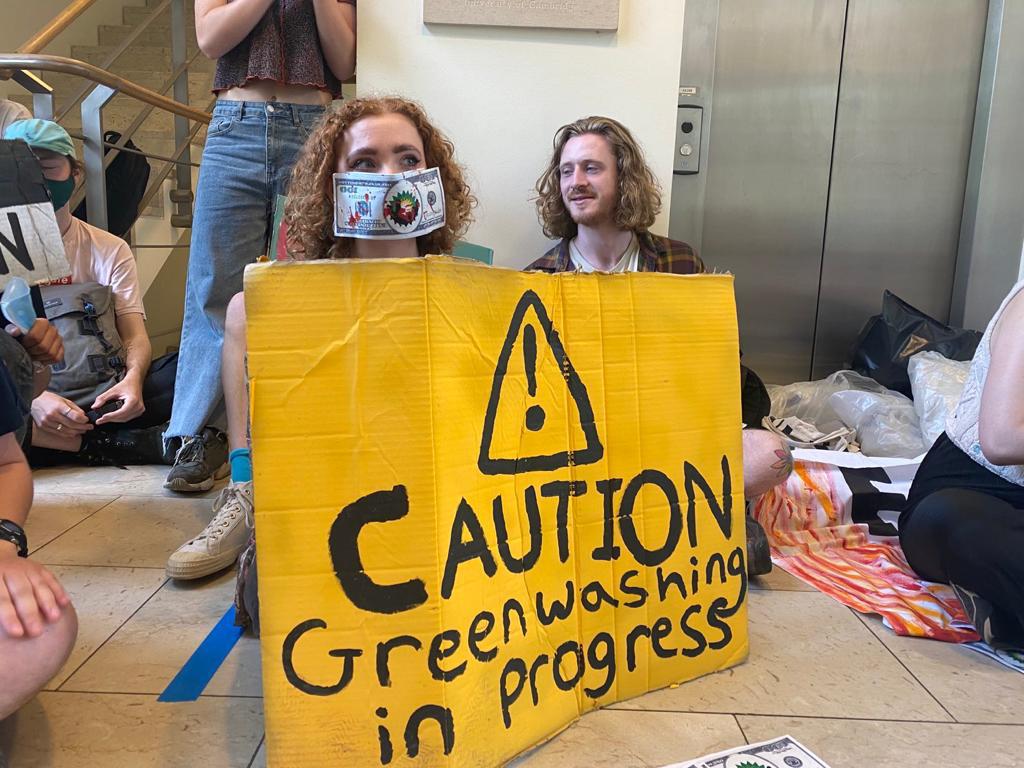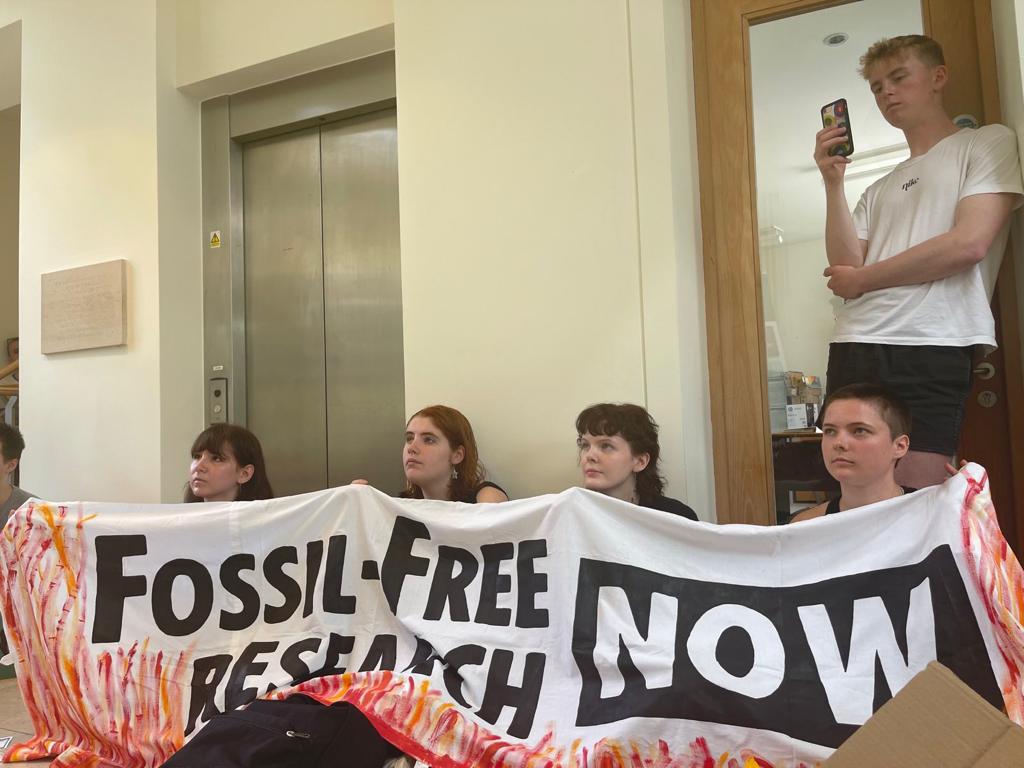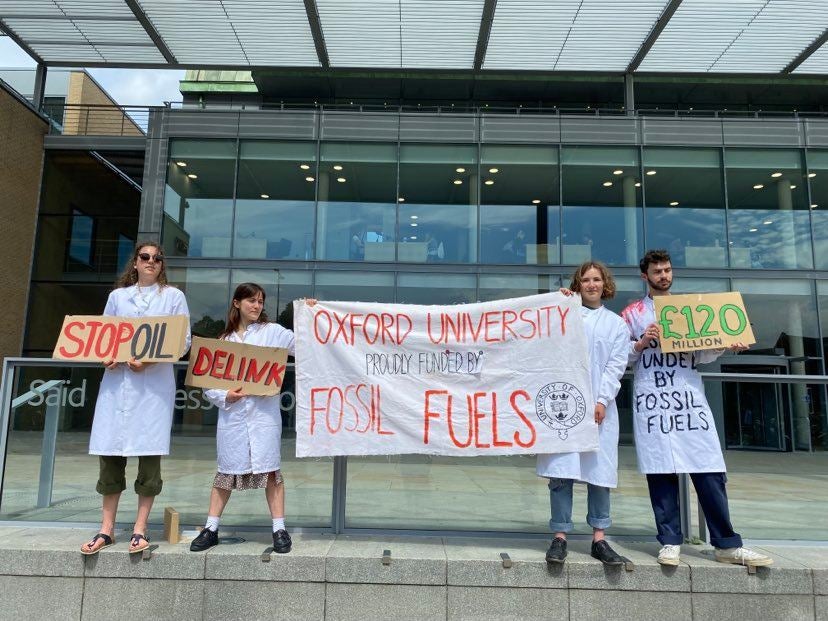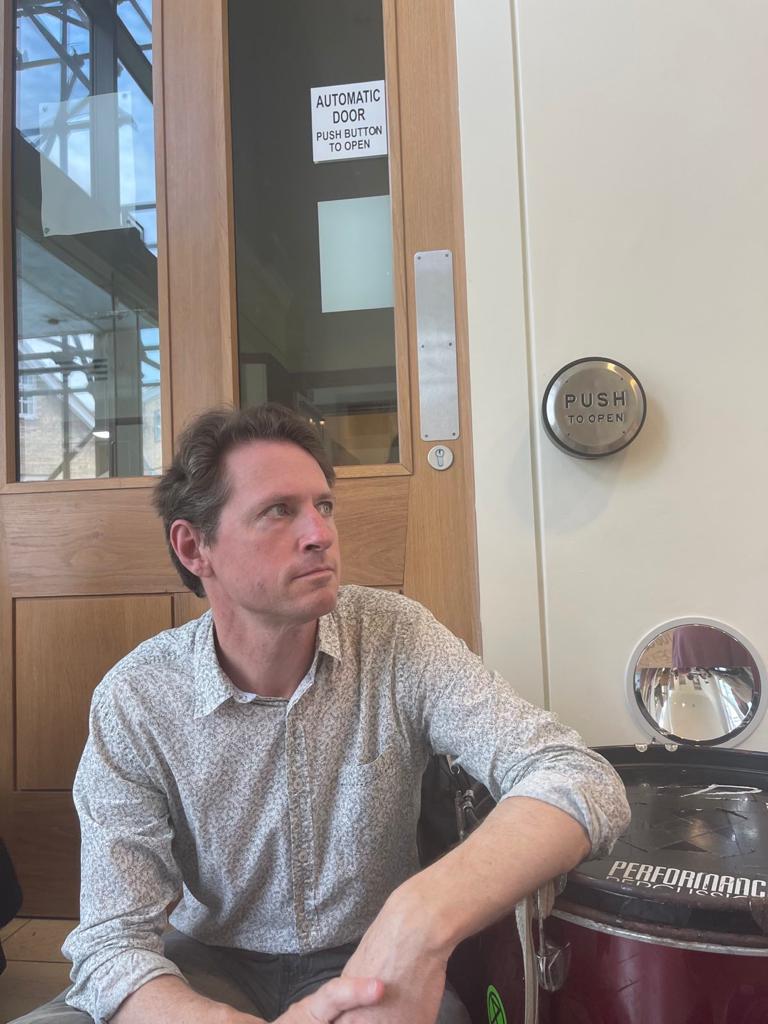Cambridge University students and academics occupy BP institute demanding end to fossil fuel funding
EXCLUSIVE: In a coordinated action, Oxford University students protested outside the Saïd Business school

Cambridge University students and academics occupied the university’s BP institute on Tuesday demanding that university leaders end research partnerships with fossil fuel companies.
The group of around 40 people, including three academics, occupied the building for 63 minutes, one for each year since they say oil companies were first alerted to the environmental dangers posed by their business model by scientists.
Students staged a theatrical performance in which figures representing BP and Shell “bought university officials’ silence”, before proceeding to “silence students who attempted to challenge BP on its environmental record”.

At the same time ten Oxford University students protested outside the Saïd Business school that received £1.3 million from Italian oil giant Eni in 2020-21, according to a report by the student-led Oxford Climate Justice Campaign.
The simultaneous actions were organised by Fossil Free Research, a campaign to end the influence of fossil fuel money on climate change-related research in universities, in conjunction with students from the two elite institutions.
In December openDemocracy reported that Cambridge and Oxford universities had received millions of pounds in funding from oil giants. The website put in a Freedom of Information request asking universities to reveal details of any funding they had received since 2017 from eight of the biggest energy firms: BP, Shell, Total, Equinor, Eni, Chevron, Exxon or ConocoPhillips.
Of those that provided details, Cambridge, Oxford and Imperial College London had received by far the most, according to openDemocracy. Cambridge University said it had accepted some £14 million, Oxford University around £8 million and Imperial College London some £54 million, it said. The Independent hasn’t independently verified this reporting.

However, Fossil Free Research argues that accepting funding for climate research helps bolster fossil fuel companies’ claims that they are committed to science-led climate action.
Jason Scott-Warren, a professor of early modern literature and culture at Cambridge University, said he was taking part in the sit-in on Tuesday because he felt it was “increasingly inappropriate” for the institution to be taking money from fossil fuel companies given the clear directives from the United Nations and the International Energy Agency that there can be no new fossil fuel exploration or production if we want to avoid the worst consequences of global heating.
Having worked with fragile historic materials in archives, Professor Scott-Warren said he was aware of the fragility of human culture and how that extended to everything around us.
“I suppose working on imaginative literature maybe I have the kind of imagination that can project forward into the future and see where things are going,” he said.

He said he hoped the students’ efforts would be successful, pointing to the success of a similar campaign that led Cambridge to divest from fossil fuel investments in 2020.
“I’m pretty optimistic, the university has been tightening up its guidelines on the acceptability of fossil fuel donations in recent years and it really is just one natural step further to say actually a lot of these donations are no longer acceptable,” he said.
Sam Gee, a first year natural science student who also took part in the sit-in on Tuesday, said he was frustrated that while Cambridge had pledged to divest from all investments in fossil fuels, it was still accepting money and partnerships with oil giants.
He pointed to the fact that Cambridge University still has a BP Institute and a Shell-endowed professorship in chemical engineering. In doing so the university lends the legitimacy of its brand to companies that are ramping up production of oil that will lead to “unacceptable consequences for people,” he said.
Mr Gee, 19, also said accepting fossil fuel industry funding for research meant to address the climate crisis undermines the academic integrity of that research. There are numerous studies that demonstrate that industry-funded research can yield results that are favourable to industry interests, he said.

“These are wealthy universities, they can fund this in other ways,” he said. “If you think about all the possible sources of funding for climate and environmental research, fossil fuel companies are about the worst possible funding source you can imagine.”
The story is similar at Oxford University where the Oxford Institute for Energy Studies is supported by multiple energy companies, including Eni, Shell and Total, according to its website.
In March Fossil Free Research published an open letter calling on US and UK universities to ban fossil fuel industry funding for climate change, environmental and energy policy research. The letter that has been signed by hundreds of leading academics says there are parallels between accepting fossil fuel industry funding for climate change research and accepting tobacco industry funding for public health research.
“Already, numerous public health and research institutions reject tobacco money due to the industry’s extensive record of spreading disinformation around the public health consequences of its products,” the open letter says.
A spokesperson for the University of Oxford said the university “safeguards the independence of its teaching and research programmes, regardless of the nature of their funding.”
“Those donating money or sponsoring programmes at the University have no influence over how academics carry out their research or what conclusions they reach. Researchers publish the results of their work whether the results are seen to be critical or favourable by industry or governments,” the spokesperson added.
The university’s partnerships with industry allow it to apply its knowledge to real challenges of pressing global concern, with funding often going directly into research into climate-related issues and renewables, the spokesperson said.
None of the philanthropic funding highlighted by Oxford Climate Justice Campaign has gone into extraction and exploration research but has been used to widen access to education and to fund scholarships, academic posts and capital costs, the spokesperson added.
Cambridge University told openDemocracy at the time of its reporting that, since October 2020, it has accepted funding from oil companies only if it was sure that the collaboration would help the UK “transition to decarbonised energy” and that donors do not direct the research they fund.
The Independent has contacted Cambridge University, as well as BP, Shell and Eni for comment.
Join our commenting forum
Join thought-provoking conversations, follow other Independent readers and see their replies
Comments
Bookmark popover
Removed from bookmarks